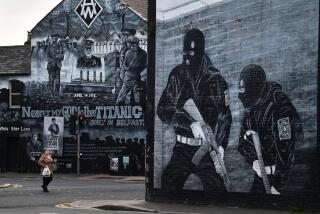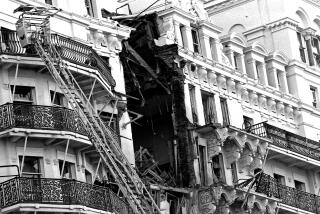Tension Heightened Over Protestants’ Parade : IRA Bombing Precedes Ulster March
- Share via
LONDONDERRY, Northern Ireland — A bomb planted by the outlawed Irish Republican Army exploded here Saturday as thousands of Protestants gathered to march in a parade celebrating a victory over a Roman Catholic king three centuries ago.
The explosion, wrecking a bar four hours before the Apprentice Boys’ Parade but causing no injuries, underlined tensions as Northern Ireland approached the 20th anniversary of the British government’s decision to send troops to Ulster.
It was the Apprentice Boys’ Parade in 1969 that touched off rioting in Roman Catholic areas and led to troops arriving in the province on Aug. 14, 1969.
Saturday’s bombing, said marcher Robert Kerr, “means we have no security.”
“For the amount of money they’re spending, we should get better security,” said Kerr, who drove 60 miles from his farm near Dungannon to join the parade.
Police said the bomb exploded shortly after 9 a.m. in a Butcher Street bar. It had been discovered by security forces who evacuated the area, but it exploded before army experts could defuse it, a spokesman said.
The explosion shattered glass in the Apprentice Boys Memorial Hall.
IRA Statement
A statement released by the IRA said the bomb was timed to go off when security forces were in the area. By planting the device, the statement said, the IRA proved it could strike despite heavy security.
The mainly Catholic IRA seeks to drive the British out of the province.
On Friday night, police said they had seized a bomb packed with 10 pounds of Semtex plastic explosives and arrested two men in the Catholic Creggan neighborhood of Londonderry.
There was heavy security Saturday along the parade route across the broad River Foyle and through the picturesque walled city, with dozens of armored police vehicles in the streets and soldiers patrolling in full combat gear.
The Royal Ulster Constabulary, a provincial police force, reported that the parade passed without incident.
Londonderry has long been a place of mythic significance to Protestants as the scene of a 15-week siege in 1689 by the forces of the exiled Catholic King James II, who had been ousted in favor of the Protestant William of Orange, the Dutch-born prince who ruled Britain jointly with his English wife and cousin, Mary.
The “no surrender” spirit of the apprentice boys who slammed the city gates to prevent their leader from capitulating lives on as a political slogan for the so-called Loyalist side--the large segment of the Protestant community that supports British rule.
Aug. 12 is the day the siege was lifted.
More to Read
Sign up for Essential California
The most important California stories and recommendations in your inbox every morning.
You may occasionally receive promotional content from the Los Angeles Times.










